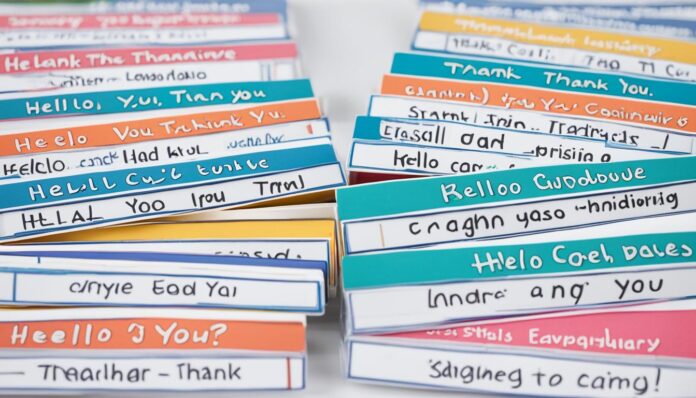Are you planning a trip or moving to a new country? Do you want to impress your friends by speaking a new language? Regardless of your motivation, learning a new language can be challenging and time-consuming. However, with the right strategies, you can quickly learn basic phrases in a new language and have conversations in no time! So, how can you quickly learn basic phrases in a new language?
In this section, we will discuss proven techniques to help you do just that. We’ll provide you with practical tips and resources to learn basic phrases in a new language fast. From setting clear language learning goals to using language learning apps and tools, we’ve got you covered. Let’s get started!
Set Clear Language Learning Goals
Learning a new language can be challenging, but setting clear language learning goals is the first step towards success. Defining your goals will help you focus your efforts and track your progress effectively. To create achievable goals, keep in mind the following:
- Be specific: Clearly define what you want to achieve. For example, “I want to learn 50 basic phrases in Spanish by the end of the month”.
- Make it measurable: Establish metrics to track your progress, such as the number of words or phrases you can understand or use in a conversation.
- Have a deadline: Give yourself a timeline to accomplish your goals. This will help you stay motivated and focused.
- Focus on basic phrases and conversation skills: Learning basic phrases and conversation skills will enable you to communicate more effectively from the start.
To stay on track, review your goals regularly and adjust them if necessary. Celebrate your achievements along the way, no matter how small they may be. With a clear sense of direction, you’ll be well on your way to speaking a new language.
Develop a Vocabulary Foundation
Learning basic phrases in a new language is impossible without a strong vocabulary foundation. To expand your word bank quickly, follow these practical tips:
- Read: Start reading books, articles, and other written materials in the language you are learning. This will expose you to new words and help you understand sentence structures.
- Listen: Listen to music, podcasts, and news in the language you are learning. This will familiarize you with pronunciation, sentence patterns, and new vocabulary.
- Flashcards: Create flashcards with new words and review them regularly. This will help you memorize words and recall them quickly.
- Chunking: Break down large words into smaller, more manageable chunks. This technique can help you remember the meaning of challenging new words.
- Use a vocabulary app: Use a language learning app that focuses on building your vocabulary. Apps like Duolingo, Rosetta Stone, and Memrise can help you learn new words in a fun and interactive way.
By following these tips, you can quickly develop a solid vocabulary foundation and start using basic phrases in no time.
Focus on Common Phrases and Expressions
To learn basic phrases efficiently, focus on commonly used phrases and expressions. These phrases are essential to be able to communicate effectively in a new language.
“Practice common phrases and build your skills from there. That’s how you learn a new language.”
-Unknown
Identifying common phrases and expressions is not difficult. Start by observing and listening carefully in real-life situations. You can also use language learning apps and resources like phrasebooks to help identify these phrases.
Practice these phrases by using them in conversations with native speakers or language exchange partners. The more you practice, the more comfortable you’ll become with the language and the quicker you’ll be able to learn.
Utilize Language Learning Apps and Tools
If you want to accelerate your language learning process, utilizing language learning apps and tools is a great way to enhance your studies. You no longer have to rely on traditional methods of language learning. Technology has made it easier than ever before to learn a new language.
There are numerous language learning apps and tools available, and it can be difficult to choose the right one for you. Some apps use gamification to make learning more fun and engaging, while others focus on providing grammar and vocabulary exercises. It’s essential to identify your learning style and find an app or tool that caters to your needs.
| Language Learning Apps and Tools | Description |
|---|---|
| Duolingo | A popular app that uses gamification to make learning fun and interactive. Duolingo covers a wide range of languages and offers courses at different levels. |
| Babbel | Babbel offers interactive courses in various languages, with a focus on conversation skills. It’s known for being user-friendly and has a diverse range of lessons available. |
| Memrise | Memrise uses a mixture of gamification and spaced repetition to help you memorize vocabulary and phrases effectively. With a vibrant community, you can learn from native speakers around the world. |
| Quizlet | Quizlet is a versatile tool that allows you to create your own flashcards and quizzes. You can search for pre-made sets in various languages or make your own to fit your needs. |
Other useful tools include language exchange apps like Tandem and HelloTalk, which allow you to practice your conversation skills with native speakers. You can also use podcasts, YouTube channels, and websites like FluentU to supplement your learning and immerse yourself in the language.
Practice Speaking with Native Speakers
One of the most effective ways to improve your language skills is by practicing speaking with native speakers. Not only do you get the chance to listen to the language being spoken naturally, but you also get to practice speaking it yourself. Here are some methods to find language exchange partners and practice basic phrases:
- Join language exchange groups on Facebook or other social media platforms. You can connect with native speakers who are also learning your language and schedule a language exchange session.
- Participate in online language exchange programs. Websites like italki or Tandem connect you with language partners from all over the world.
- Attend language exchange events in your community. Look for language learning communities or groups in your area that organize language exchange meetups.
Practice speaking basic phrases with your language partner and ask for feedback on your pronunciation and grammar. Don’t be afraid to make mistakes; it’s all part of the learning process!
“The limits of my language mean the limits of my world.” – Ludwig Wittgenstein
Speaking with native speakers can be nerve-wracking, but it’s also a fun and rewarding experience. Take advantage of the opportunities available to you and don’t be afraid to step out of your comfort zone!
Immerse Yourself in the Language
One of the most effective ways to learn a new language quickly is to immerse yourself in it. This means surrounding yourself with the language as much as possible. Here are some activities that can help you immerse yourself in the language:
- Watch movies and TV shows – This is a great way to improve your listening comprehension skills and pick up new vocabulary. Look for movies and shows that are in the language you’re learning, and use subtitles if necessary.
- Listen to podcasts – Podcasts are a convenient way to practice listening to the language, and they cover a wide range of topics. You can find podcasts on almost any subject, from news to comedy to language learning.
- Read books – Reading books in the language is a good way to build your vocabulary and improve your comprehension skills. Start with books that are aimed at beginners and work your way up to more advanced material.
Remember, the key to immersion is to make it fun and engaging. Choose activities that you enjoy and that keep you motivated to continue learning.
Create Flashcards and Use Mnemonics
Learning basic phrases in a new language can be challenging, but creating flashcards and using mnemonic techniques can make this process more effective. Flashcards are an excellent tool for memorizing vocabulary and short phrases, and mnemonics provide you with memory aids that help you retain information for longer periods.
One of the most significant benefits of using flashcards is that they allow you to focus your attention on specific phrases or words. Whether you’re practicing on your own or with a study partner, flashcards can be an efficient way to learn and retain new information. Additionally, flashcards are portable, making it easy to practice your language skills on the go.
Another useful technique for retaining information is through mnemonics. These are memory aids that help you associate new information with things you’re already familiar with. For example, ‘Mi carro es rojo’ could be associated with ‘My car is red,’ through the use of the mnemonic “CAR.”
To create effective flashcards, keep them simple and to the point. Only include the basic phrase or word you want to learn, along with any relevant translations or definitions. Adding too much information can be overwhelming and make it harder to memorize the material.
When using mnemonics, try coming up with associations that are personal or relevant to you. By doing so, you’ll be more likely to remember the information. No matter which method you choose, utilizing flashcards and mnemonics can be a game-changer in your language learning experience.
Table of Contents
- What are flashcards and why are they important in language learning?
- What are mnemonic techniques for memorizing information?
- How can I create effective flashcards?
- What are some mnemonic techniques for learning new languages?
Consistency and Regular Practice
To master basic phrases in a new language, consistency and regular practice are key. Learning a language is like exercising a muscle; the more you use it, the stronger it gets. By incorporating language learning into your daily routine, you can establish a study schedule that works for you.
Set aside a dedicated time each day or week to practice your language skills. Consider using a language-learning app or finding a language exchange partner to practice with regularly.
It’s important to stay consistent with your practice, even if it’s just for a short period each day. This will help solidify what you have learned and keep you motivated to continue learning.
Remember to also practice outside of your structured study time. Label items around your home with their corresponding words in your target language, listen to music or podcasts in the language, and try to think and speak in the language throughout the day.
4 Tips for Incorporating Language Learning into Your Daily Routine
| TIP | DESCRIPTION |
|---|---|
| 1. | Designate a specific time each day for language practice. |
| 2. | Use a language-learning app during your commute or downtime. |
| 3. | Label household items with their corresponding words in your target language. |
| 4. | Practice thinking and speaking in the language throughout the day. |
By staying consistent with your language learning and incorporating regular practice into your daily routine, you’ll be able to quickly master basic phrases in a new language.
Conclusion
Learning basic phrases in a new language can be challenging, but with the right strategies and techniques, you can quickly improve your language skills. By setting clear language learning goals that focus on basic phrases and conversation skills, developing a strong vocabulary foundation, prioritizing common phrases and expressions, utilizing language learning apps and tools, practicing with native speakers, immersing yourself in the language, using flashcards and mnemonics, and maintaining consistency and regular practice, you’ll be well on your way to mastering a new language.
Remember, the key is to stay motivated and committed to your language learning journey. Don’t be afraid to make mistakes and practice as often as you can. With these tips and tricks, you’ll be able to confidently communicate with native speakers in no time.

















































